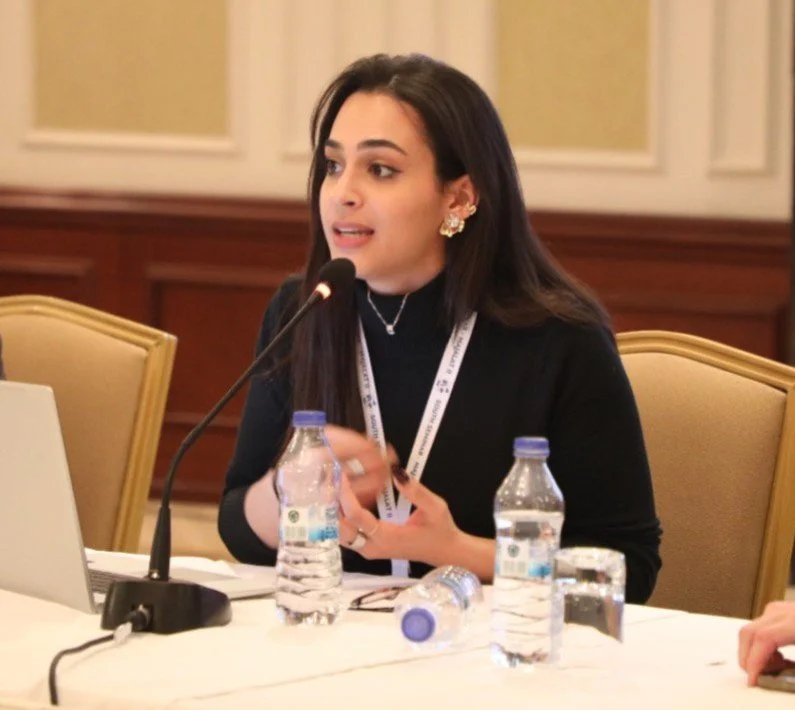GMHAN at the UN HLM: Hear from Sasha Hajj-Assaf
Sasha Hajj-Assaf
Co-founder & President, Justice for Mental Health (Lebanon)
Can you share a bit about your background and the work you’re doing in mental health, and how it connects to the UN High-Level Meeting (HLM) on Non-Communicable Diseases (NCDs) and Mental Health?
I am a Lebanese lived experience and human rights advocate, and the co-founder and president of Lebanon’s only lived experience association, one of the very few in the region. My personal journey navigating the mental health system was the starting point of my advocacy. Living with a mental health condition and experiencing the darker side of psychiatry gave me a deep understanding of the flaws of the system.
My legal background, combined with extensive experience in human rights, has grounded my advocacy in justice and rights. This rights-based lens shapes my work that includes promoting recovery, rehabilitation, and community integration to challenging stigma, discrimination, and the biomedical dominance that too often defines mental health care. Through my association, I work to represent the voices of service users and ensure they are present in every conversation where mental health is discussed.
My efforts focus on raising awareness of the rights of people with lived experience, advocating for fairer laws, and promoting recovery-oriented, person-centered tools in practice. I also emphasize the importance of treating lived experience knowledge as valuable professional expertise, integrating it into research, policy, and program development. Equity and justice in mental health are at the core of my work, which manifests in pushing for accountability, accommodation, and meaningful reform while amplifying the voices of those too often left out of decision-making.
From your perspective, why is it critical for world leaders to prioritise mental health alongside other global health and development issues at UN HLM?
Mental health must be a global priority because it concerns us all. Mental health conditions and challenges do not discriminate, they can affect anyone, regardless of nationality, gender, race, religion, or status.
Coming from a region marked by decades of instability and turmoil, I have seen how every type of crisis, whether war, economic collapse, or displacement, leaves one constant consequence: poor mental health. This impact does not remain isolated. Poor mental health creates a ripple effect, undermining employment and economic productivity, worsening physical health through comorbidities, and shaping social behavior in ways that can perpetuate trauma, cycles of violence, and intergenerational harm.
In this sense, mental health is inseparable from development. It is health, it is a human right, and it is at the heart of every crisis. When world leaders recognize this and prioritize mental health alongside other global health and development issues, they are not only addressing individual well-being, they are investing in stronger economies, healthier societies, and more resilient communities.
We already have the evidence and best practices to guide us, grounded in recovery, justice, and rights. What is needed now is leadership and commitment at the highest level to ensure mental health is fully integrated into global health and development agendas.
If global leaders make strong commitments on mental health at the UN HLM, how would that advance mental health in your country?
In Lebanon, there have been important steps toward strengthening the mental health system, including the establishment of the National Mental Health Program within the Ministry of Public Health and the active role of many organizations working to respond to urgent needs, especially following major crises such as the Beirut Port blast, the economic collapse, and ongoing regional instability. However, our mental health system remains fragile. It relies heavily on non-profit organizations and external funding, which makes it vulnerable to resource shortages and funding cuts. This has been one of the greatest obstacles to building a sustainable, rights-based mental health system.
If global leaders make strong commitments on mental health at the UN HLM, it could directly benefit Lebanon by helping secure more sustainable resources, encouraging the allocation of a fair share of the national budget to mental health, and elevating mental health as a legislative and policy priority. Such global commitments can also act as influence for local advocacy, pushing for national reforms and ensuring that mental health is not treated as an afterthought but as a central component of health and development.
Ultimately, international leadership and commitments can provide the momentum Lebanon needs to move from reliance on short-term projects to building a stronger, more sustainable, and equitable mental health system.
Sasha’s call to action
“Prioritize mental health, it affects everyone. Center lived experience, justice, and rights, and invest in recovery and dignity for all.”
Learn more about how GMHAN has been convening the sector and amplifying the voices of national partners to influence the outcomes of the HLM on NCDs and Mental Health.

